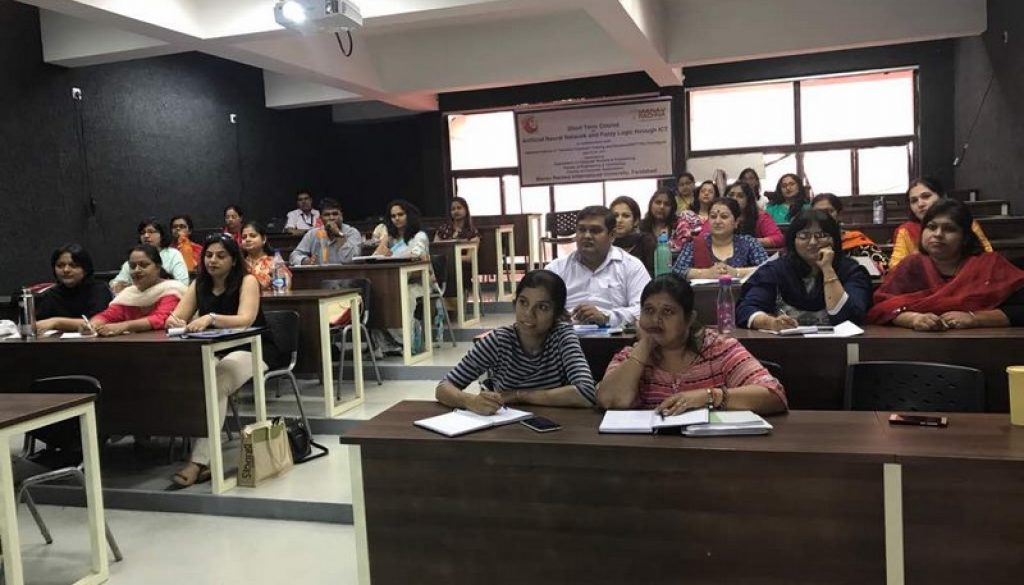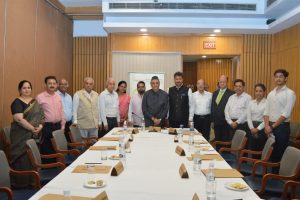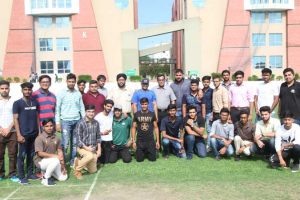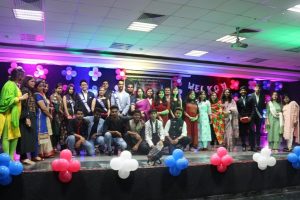Short term course on “Artificial Neural Network and Fuzzy Logic through ICT”
The current scenario of research in Computer Science is having wide focus on the Neural Network and Fuzzy Logic as these fields are in some or large extend related with Artificial Intelligence and Machine Learning. So keeping all this in mind, Department of Computer Science & Engineering, Faculty of Engineering and Technology and Faculty of Computer Applications, MRIU, organized a five days short term course on “Artificial Neural Network and Fuzzy Logic through ICT” during 24.04.2017 to 28.04.2017. The course was delivered by the faculties of National Institute of Technical Teachers Training and Research, Chandigarh.
There were 28 participants, wherein 25 Participants were from MREI and 3 participants from DAV Institute of Management, Faridabad. During this course, a wide variety of topics were discussed and some of the current research topics were explored.


On the first day Dr. Maitree Dutta, Head, Department of CSE, National Institute of Technical Teachers Training and Research, Chandigarh, inaugurated the event. Dr. S. S. Tyagi, Professor, CSE, on the behalf of Manav Rachna International University, addressed the participants of different remote centers and praised the initiative of NITTTR, Chandigarh, to choose this topic and provide such a platform for the participants. After the inauguration, a session on Overview of Neural Network was taken by Dr. Maitree Dutta, who explained all the terms and terminologies which are commonly used in neural networks to lay down the foundation of the course. She covered different types of neural networks such as feed-forward neural network, Radial basis function (RBF) network, Recurrent neural network, Modular neural networks, Physical neural network.
On the second day, Dr Maitree Dutta, delivered a talk on ‘Perceptron’, in which she explained about the Perceptron and how do we train a Perceptron. In her discussion, she talked about the different models of Perceptron such as Single layer Perceptron, Gradient descent learning , Multi-layer Perceptron, Back-propagation and a general model. She covered some practical issues such as rate of learning , pattern and batch, modes of training, initialization, scaling, stopping criteria, the number of training examples, the number of layers and neurons. Next she covered Back-propagation network in detail and discussed about the different aspects covered in back propagation networks.
On the third day, first session was taken by Dr. Renu Vig, Director, UIET, Chandigarh, in which she explained Associative memory and its applications and covered all current research trends and association of this with artificial neural network. Later, Dr. H K Sardana, Chief Scientist, CSIO, Chandigarh, discussed some research examples of neural network. Mrs. Shano Solanki discussed about the Fuzzy logic and its application in different areas.
On the Fourth day, first session was taken by Dr. Maitree Dutta on Adaptive Resonance theory in which she covered all the aspects of Adaptive Resonance theory and she took an example of one of the research scholar who is doing research under her and demonstrated some results and commands of MATLAB. She explained MATLAB Programming for neural network and some programming Examples. After that one of her research scholar Ms. Jagrity Saini took a session on Optimization techniques in which she explained different methods of Artificial Neural Network optimization which include different local and global methods. She said that Back propagation is the most common method for optimization. Other methods like genetic algorithm were explained and an overview of gradient descent optimization algorithms was provided.
On the Fifth day, first session was continued by Ms. Jagrity Saini, in which she explained Hopfield, RBF network and MATLAB solutions of different problems were discussed. After that an On-line test was conducted to ascertain the knowledge gained through this course. And it was followed by a Valedictory session, which was addressed by Dr. Maitree Dutta, in which she took a feedback from each remote center, and some suggestions were provided to improve the quality of such Course.





